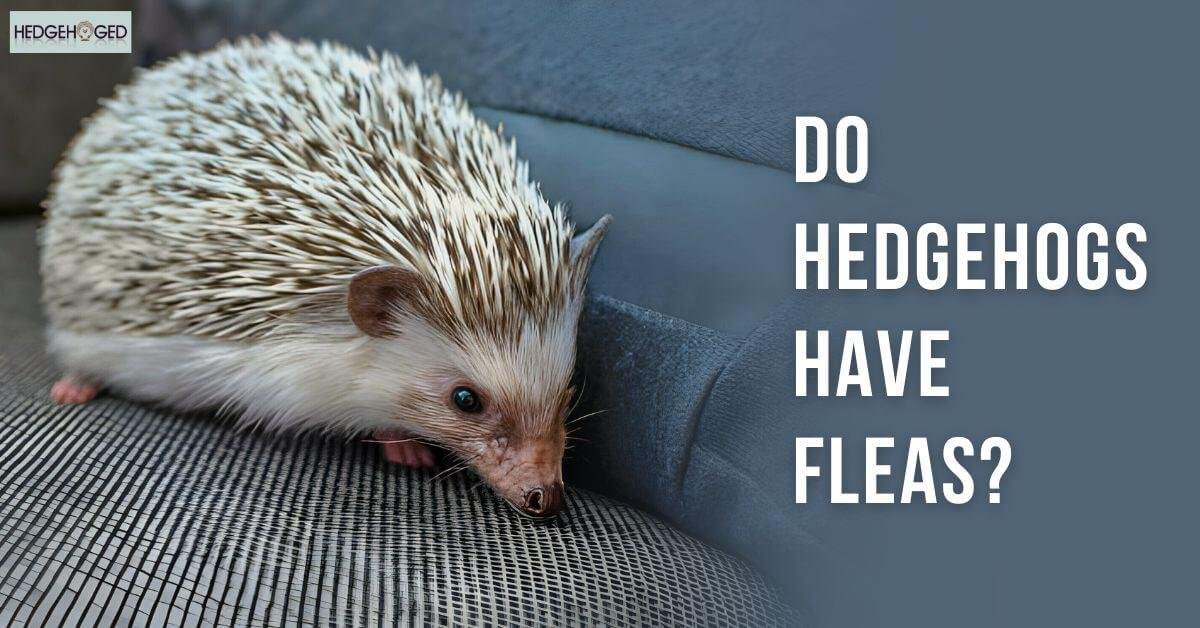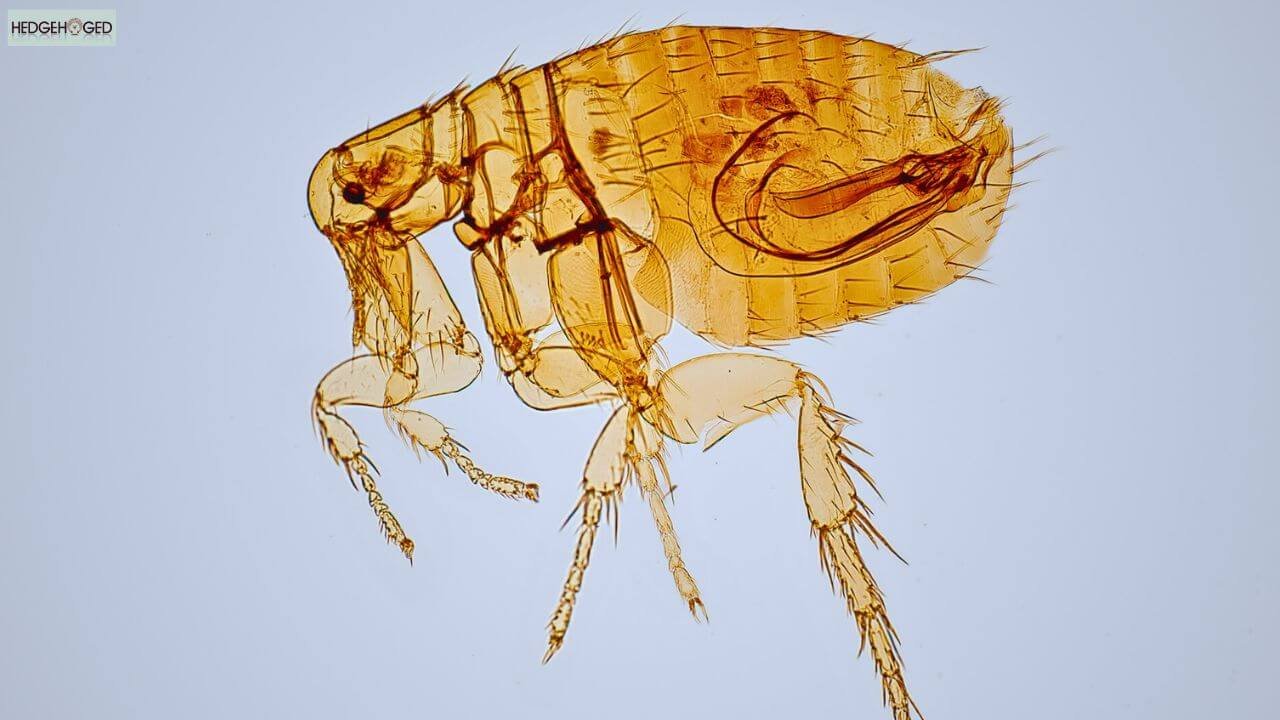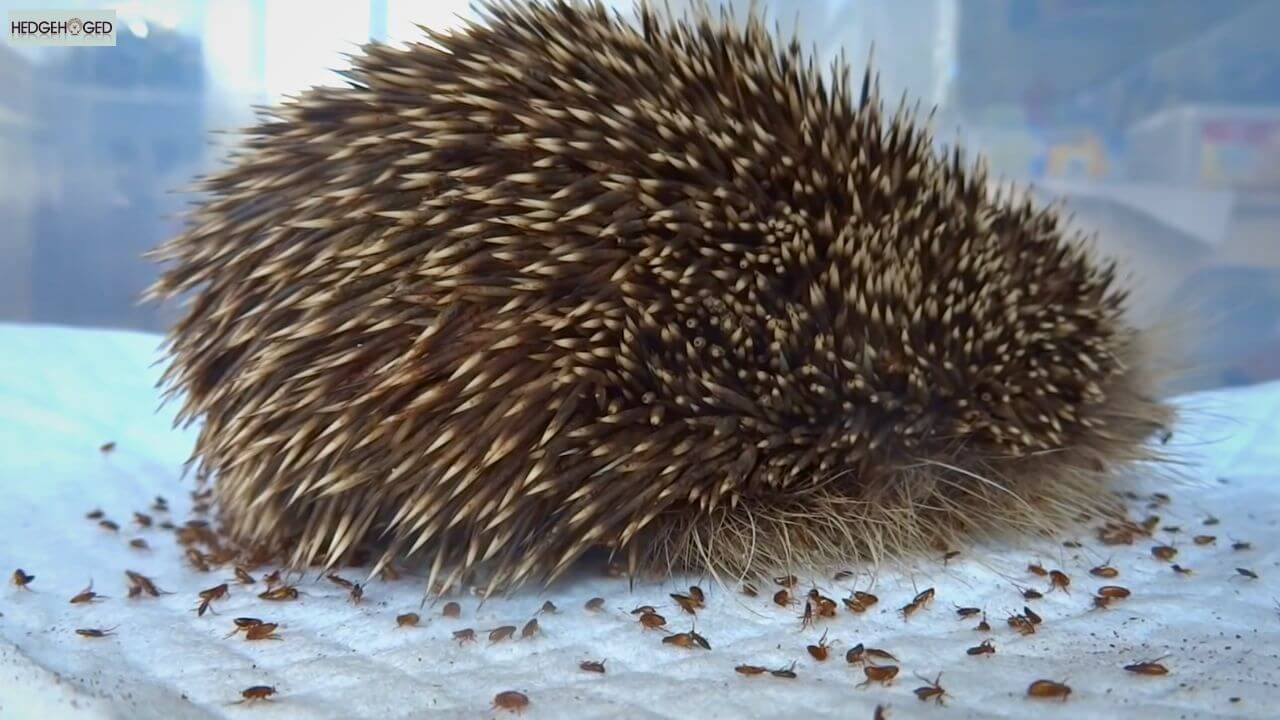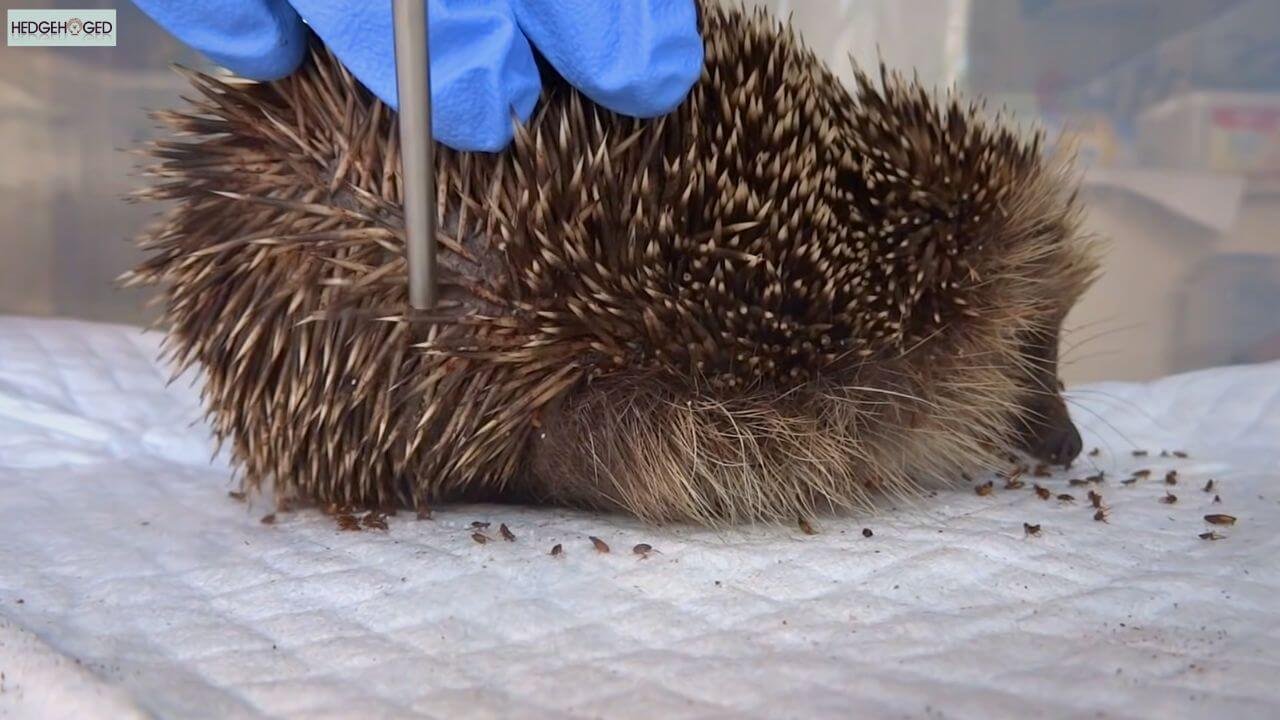Hedgehogs are famous animals, and we receive numerous inquiries about them from prospective owners. As pets, hedgehogs need a lot of work and attention from their owners. One of the most common inquiries we hear Do Hedgehogs Have Fleas?
The answer is “yes.” Hedgehogs can have fleas. But don’t worry, it’s normal and they won’t infect you, your kids, or your dog. Most of the time, they don’t hurt the hedgehog and could even be helpful. Let’s examine the facts of fleas on hedgehogs.
If you want to understand more about the many types of fleas that infect hedgehogs before purchasing one, continue reading as we take a deeper look. In this article, we’ll deeply explain about the fleas and its types.
What Are Hedgehog Fleas?
Archaeopsylla echinacea is the scientific name for hedgehog fleas, which are tiny parasites. In the UK, there are more than 50 different kinds of fleas, including the hedgehog flea (archeopsylla echinacea). Though they occasionally exist in small quantities on other species, they have developed particularly to thrive on hedgehogs.
They, like other fleas, are little, flightless insects that are 2 to 3 millimeters in length. They have smooth flattened bodies that are suited to gliding through hedgehog hair and spines, as well as strong muscular rear legs that let them move fast through their surroundings and jump more than 50 times their height when necessary.
They lay their eggs in the host’s nesting area and hatch to consume the leftovers of the birthing before developing into fully mature fleas that reside on the host, these fleas’ reproductive cycle is closely linked to that of hedgehogs. Almost all hedgehogs in the wild carry these fleas on their bodies; on average, each body has approximately 100, while some poor individuals may have many times that number.
Hedgehog fleas develop in four stages:
Eggs
The hedgehog flea deposits its eggs in the nest of the hedgehog rather than on the animal, in contrast to several other species of flea. Throughout her life, an adult female flea may lay thousands of eggs.
Larvae
The little, white blob that resides in the hedgehog nest is the larvae of the hedgehog flea. They prefer the pre-digested blood found in adult flea feces or dead flea eggs, although they will eat any organic waste. They reside in the nest.
Pupae
When the larvae have had enough food, they will form a cocoon and turn into adult fleas. However, a flea’s pupae stage is quite flexible, and its adult form won’t appear until it detects the presence of a hedgehog nearby that it can climb onto.
This is crucial information since an adult flea cannot survive for very long without its first meal. If the flea doesn’t sense the presence of a host, it might stay in the larval stage for a few months. Vibration, increased temperature from the animal’s body heat, and increased atmospheric carbon dioxide from breathing can all be used to detect the presence of a host animal.
Adult
The lifespan of an adult hedgehog flea is two to three months. but without nourishment, can only endure for a few days. A female flea will consume 15 times her body weight in blood each day; they are bloodsuckers.
Once they have consumed their first blood meal, hedgehog fleas cannot stop reproducing. After eating this meal, males lose their testicular plug and females mature in their ovaries. Hedgehog fleas are host-specific, meaning they can only live on hedgehogs, much like many other flea species.
Do Hedgehogs Have Fleas?
Unfortunately, fleas are a regular problem for hedgehogs, but the good thing is that they only have one type of flea, which is distinct from the one observed on cats and dogs. In most circumstances, they do not damage the hedgehog and may even benefit them.
Where Do Hedgehog Fleas Live?
Hedgehog fleas that are adults reside on the hog, but their larvae and pupae hatch from eggs in the nest. Because of this, it’s a good idea to clean out your hedgehog habitat at least twice a year and to replace the bedding every day if you’re raising hedgehogs inside. Adult fleas require frequent feedings; if they lose their host and are unable to locate another, they will perish in a few days. They cannot survive long apart from the animals they host.
Will Fleas Harm a Hedgehog?
No, fleas generally won’t harm a hedgehog. While not every hog has fleas, the majority do, and an adult hog may harbor several hundred fleas without suffering any negative consequences.
Flea bites don’t appear to bother them very much, which may be because the hedgehog’s back has especially thick, insensitive skin. Flea bites can very rarely get infected, which can be problematic. Anaemia can also result from an extremely severe infestation in a sick or immature hog. However, in general, the hedgehog and his fleas get along just nicely.
Can My Pets Catch Fleas From Hedgehogs?
Nope, this is just another folktale. Hedgehogs cannot transmit fleas to your pets. The hedgehog flea is host-specific, as we have shown. It is unable to procreate and finish its life cycle on other creatures. Hence, even if a hedgehog flea could land on you, your dog, or your cat, it won’t remain there for very long and won’t produce eggs.
If hedgehog fleas latch onto you or your pets, they might bite you. Although it’s not harmful, this is annoying. As if all those spines weren’t already enough of a reason to wear gloves while handling hedgehogs, this is another one.
Do Hedgehogs Need Their Fleas?
An old wives’ story said hedgehogs would perish if they did not have fleas. This is an absurd and untrue notion. In other words, European hedgehogs are prospering in New Zealand, where they were introduced and are currently regarded as invasive alien species. However, they are flea-free.
It is believed that the fleas vanished on the journey from England. However, there is some conjecture that fleas may help hoglets develop a certain immunity to illnesses that affect hedgehogs by passing it on from their mother. The fleas reside in the nest and feed on the mother’s blood at first. They then insert mouth parts that are stained with the mother’s blood into the hoglets, transferring antibodies along the way.
Because fleas are inherited from mothers and may protect their young from illness, it is plausible that possessing fleas may benefit the race of hedgehogs as a whole, if not every individual hedgehog, by enhancing their immune responses. But that’s just conjecture.
Can I De-flea a Hedgehog I am Caring For?
Many hedgehog rescues de-flea the animals they adopt. As previously indicated, fleas from a hedgehog cannot be “caught” by you or your pets; yet, they may leap on you and bite. Furthermore, while fleas are generally not a concern for hedgehogs, a severe infestation may be dangerous for ill or young hogs.
Therefore, getting rid of the fleas may make sense in a hospital or care setting. Usually, a flea powder is used for this; however, because there isn’t a hedgehog-specific flea powder on the market, we advise you to speak with your veterinarian or a nearby rescue organization to determine the best product to use. In any event, avoid using flea spray and never attempt to attach a collar to a hedgehog.
How to get rid of Hedgehog Fleas?
You’ll need to clean and treat the hedgehog and its living space to get rid of hedgehog fleas. First, bathe your hedgehog in warm water with a gentle shampoo meant for little pets. This aids in getting rid of any fleas on its fur. After that, give its cage, bedding, and any other surroundings a thorough cleaning to get rid of flea eggs and larvae.
To remove any fleas or eggs, use a vacuum cleaner. Additionally, get advice from a veterinarian to obtain appropriate flea treatment treatments for hedgehogs. Maintaining hygiene and regular grooming are essential to keeping your hedgehog flea-free.
What Other Parasites Might Afflict My Hedgehog?
Unfortunately, there are a few additional parasites that might cause problems for your hedgehog, such as the hedgehog tick, which is a parasitic species that feeds on hedgehogs. Additionally, internal parasites like worms that can harm the heart and digestive system may impact your cat. You also need to watch out for ringworm, which is a sort of skin fungus that affects many hedgehogs but is not a parasite.
Do Hedgehogs Have Fleas on Humans
Although fleas are known to be carried by hedgehogs, they usually do not infect people in the same way as they may their hedgehog hosts. Nonetheless, a human might still be bitten or irritated by a hedgehog flea if it jumps onto them.
It is advisable to properly wash your hands after handling a hedgehog that has fleas and to keep your face away from it until you are certain that you are flea-free. Reducing the likelihood of fleas spreading to people may be achieved by keeping your hedgehog clean and taking quick care of any flea issues. Hedgehog and human comfort depend on regular cleaning and grooming.
FAQs
Q1. Do hedgehog fleas attack people?
A hedgehog flea caused several flea bites in a 48-year-old patient. The European hedgehog is the primary host of the hedgehog flea.
Q2. How long do hedgehog fleas survive?
The lifespan of an adult hedgehog flea is two to three months. but without nourishment, can only endure for a few days.
Q3. How did my hedgehog acquire fleas?
Most likely, his mother had a large number of fleas, which he took up from her in the nest. Hedgehog fleas are host-specific, thus they won’t.
Q4. How do I get rid of fleas on my hedgehog?
Topical flea powders, premise sprays, and even professional insect exterminators may be beneficial but speak with your doctor first.
Q5. How many fleas may be found on a hedgehog?
The average hedgehog can have up to a thousand fleas on it. This may be related to hedgehogs’ insufficient capacity for self-cleaning due to their spines.
Conclusion
In conclusion, Do Hedgehogs Have Fleas? This post gives a brief answer. Although fleas are widespread in wild hedgehogs, there is extremely little chance that your pet will have fleas, especially if you live in the United States. The majority of hedgehogs available for purchase are raised in captivity by domestic breeders, as hedgehog fleas are not indigenous to the nation.
Your pet would not likely get fleas if you lived in one of the European nations where they are native, since they cannot enter your home and do not dwell on dogs or cats. But chances are good that a hedgehog you catch in the wild will have flea infestations.




